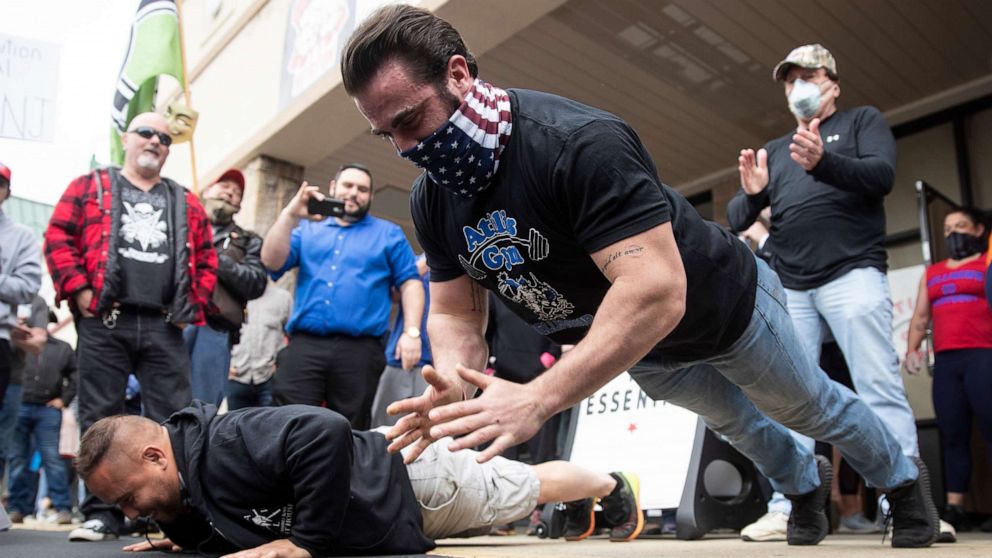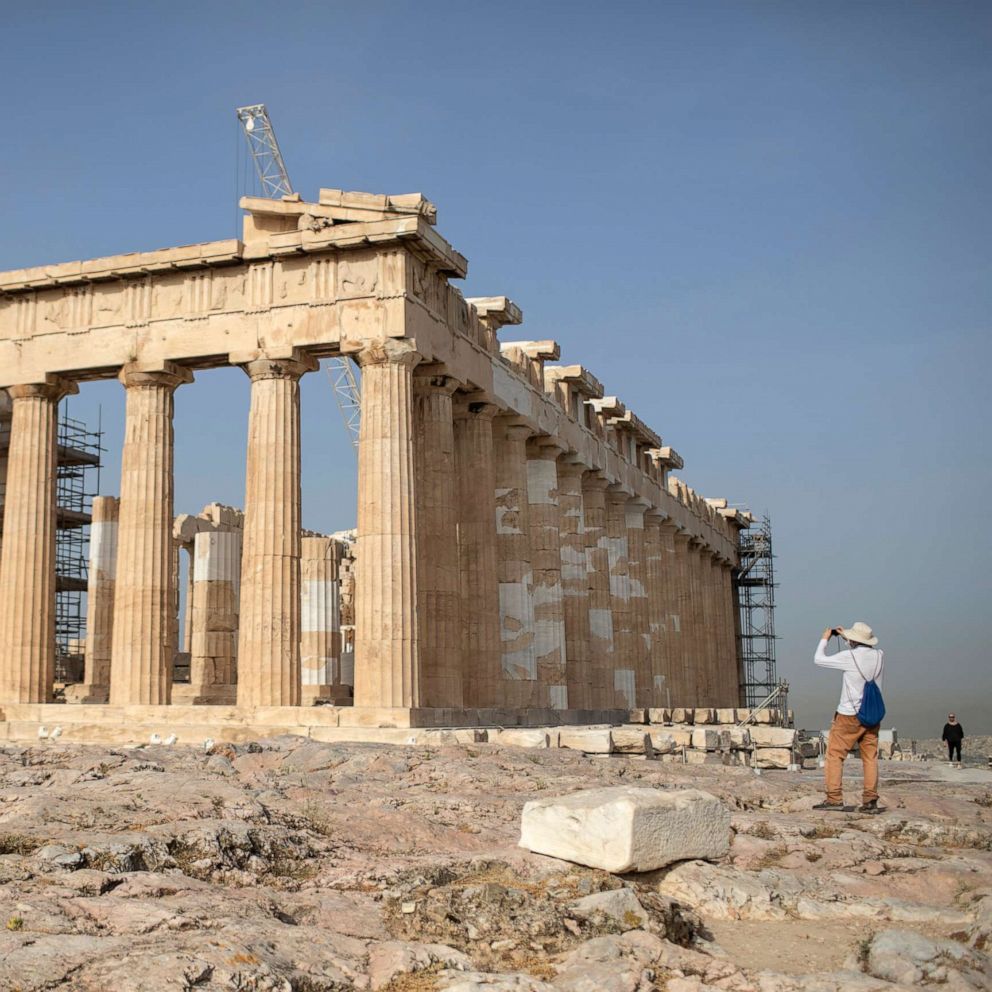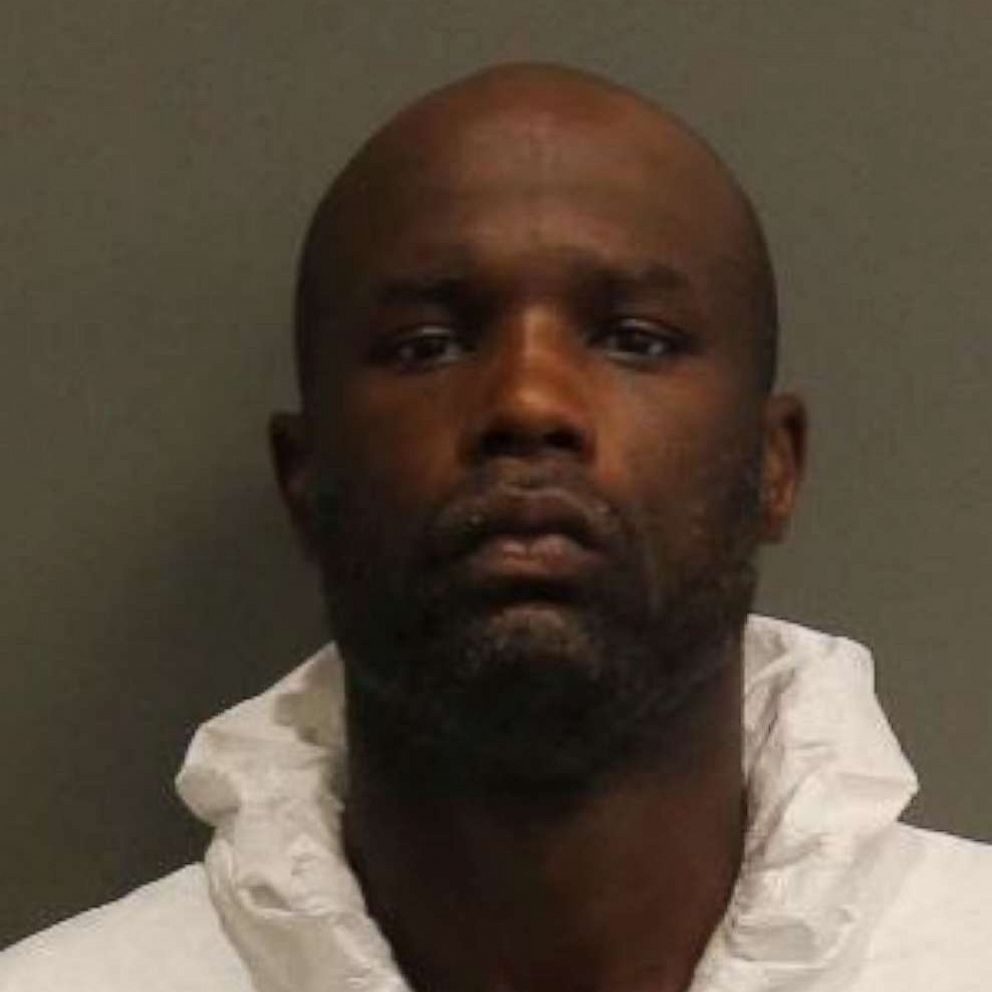Coronavirus lockdowns spark acts of resistance despite warnings of health consequences
Since the age of 18, Collin Whitney says his dream has been to own a gym for powerlifters like himself. In September, he opened PWRBLD in Conshohocken, Pennsylvania, only to have to close the business when the coronavirus pandemic struck.
On Monday, Whitney reopened his gym despite Pennsylvania Gov. Tom Wolf's stay-at-home orders requiring all nonessential businesses such as his to remain shuttered. Whitney, now 30, said he took action less out of defiance and more out of desperation.
"What's the alternative? It's open up and try, or just sit back and see it all go away anyway," Whitney told ABC News, adding that his overhead costs, including rent and utilities, is about $8,500 a month. "The last month of bills across the board have been paid right out of my personal account. My personal savings is just dwindling down to all but nothing."
As some stay-at-home orders across the country remain in place and reopening plans roll out slowly, business owners like Whitney and individuals fed up with the government response to the pandemic are taking matters into their own hands against the advice of public health officials who argue they could trigger a spike in cases and in turn delay the economic reopening further.
Numerous protests have erupted around the country in recent weeks involving many demonstrators who are unemployed due to the economic collapse brought on by the virus. Organizers say they are defying stay-at-home orders to demand the economy be restarted. Others have held religious services in defiance of government orders.
The acts of protest have garnered support from conservative politicians and pundits among others, who argue that governors, mainly Democratic, have overreached their authority. President Trump, for instance, in April issued a series of "LIBERATE" tweets directed at Minnesota, Michigan and Virginia. He has also repeatedly emphasized the need not to make the effects of the economic shutdown worse than the virus itself and pushed states to reopen.
Risk of transmission
These acts of civil disobedience, lauded and criticized in different corners, have elicited harsh words from some medical experts.
"They're obviously putting themselves at risk and putting others at risk of transmission. So my proposal is: if you're so sure of your need to go to a tattoo parlor or a bowling alley or get a haircut, then sign a pledge that says, 'If I get sick, I'll forego medical treatment if it's scarce," Dr. Arthur Caplan, founding director of the division of medical ethics at New York University Langone Medical Center, told ABC News.
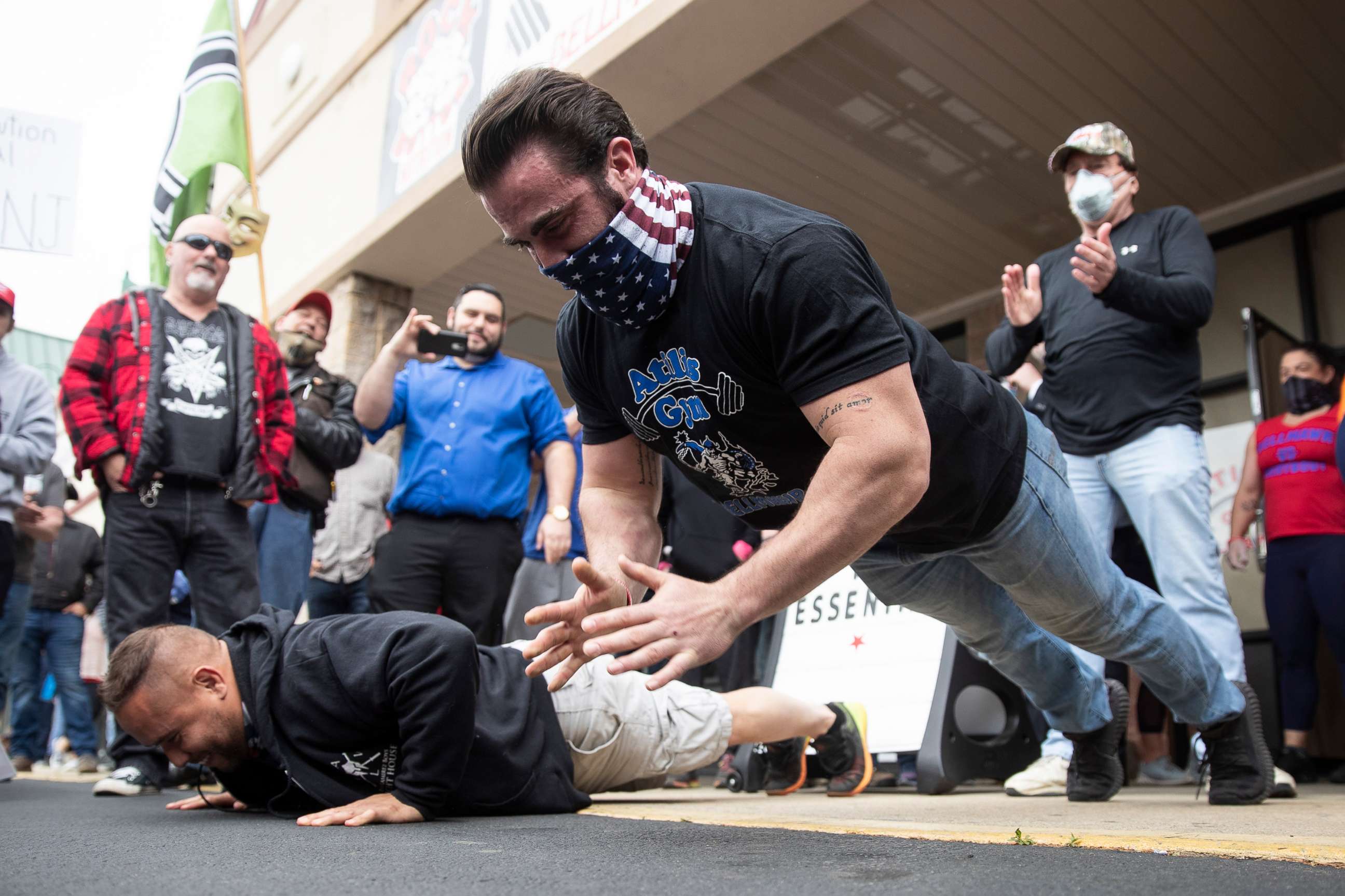
''Liberty is one thing but it comes with responsibility," Caplan added. "What's going on here is people have what I'll call an eighth-grade view of liberty, like 'I can do what I want. That's what liberty means.' It doesn't. We're not supposed to be able to endanger others or cause harm to others. If you cause an outbreak and you're sick, I think you should be willing to say, 'I'll pay the price for my choices.'"
But Whitney said he has gone "above and beyond" what is required to keep people safe in his gym. He said he has restricted the number of members in his 3,000-square-foot workout facility to 10 at a time, requiring each to use hand sanitizer, to socially distance while working out and to wipe down equipment before and after use. Whitney said he is not requiring members to wear masks while working out.
''If there was another way, I would probably try to extend it (staying closed) a little bit further. But when you're pushed to the edge, I refuse to set back and allow it to fail," said Whitney, adding that he's been waiting for weeks to hear whether his application has been approved for an Economic Injury Disaster Loan Emergency Advance from the U.S. Small Business Administration. The federal government's COVID business assistance programs as well as state unemployment systems have been plagued with problems.
While he feared the local police would bring the hammer down on him, he said that as of Wednesday no law enforcement officers had shown up to shut him down.
'Everybody be safe'
Just over the Delaware River from Whitney's gym, another workout facility became a rallying point.
More than 200 people showed up to support the reopening of Atilis gym in Bellmawr, New Jersey, on Monday by waving American flags and chanting "U.S.A! U.S.A.!" as the doors opened at 8 a.m. Gym owners Ian Smith and Frank Trumbetti said they, too, restricted the number of members inside the center and put in place social-distancing and sanitation rules, including making masks mandatory, in an attempt to keep people safe.
At 10:30 a.m., a group of Bellmawr police officers arrived.
"You are formally in violation of the executive order," an officer, wearing a face mask told Smith and Trumbetti.
After handing the owners a $2,000 citation for violating the rules, the same officer then spoke to the crowd outside the gym.
"We are ... only here for everybody's safety today," the officer said as the crowd quieted down. "We plan for the worst and hope for the best and it seems like that's what we have out here today. Normally, you are all in violation of the executive order. On that note, have a good day. Everybody be safe."
As the officers walked away, the crowd burst into wild cheers, and Smith celebrated with an impromptu push-up contest with a gym member.
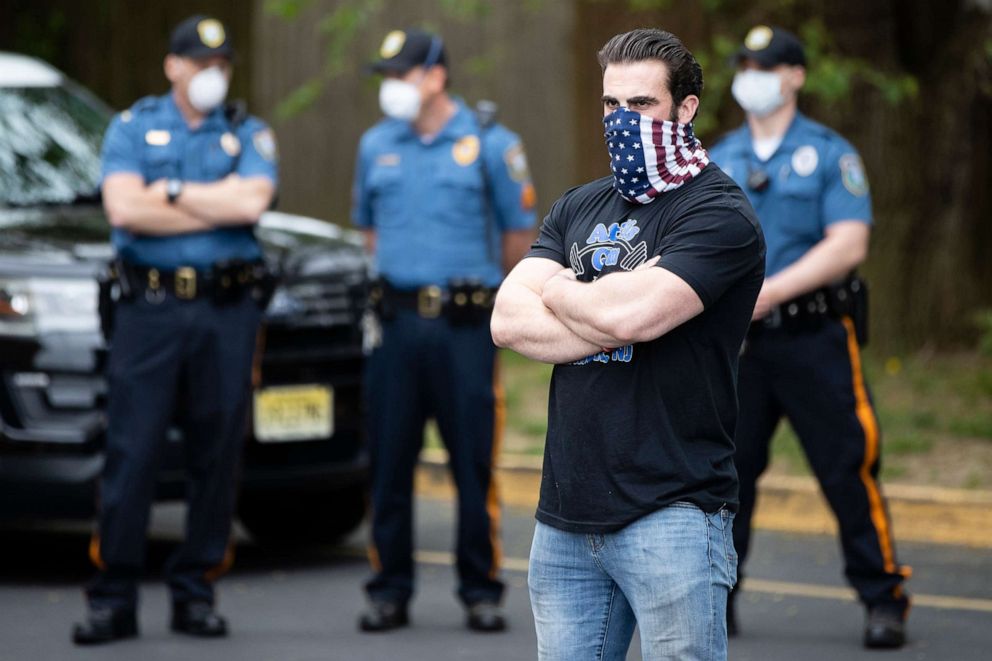
Prior to reopening, Trumbetti posted an emotional video on Facebook to address those who have criticized him and Smith as being selfish and not taking the threat of this virus seriously. He revealed his mother is non-responsive in a hospital with coronavirus, which has infected more than 150,000 people in New Jersey and killed more than 10,000, including 286 in Camden County where Bellmawr is located.
"So I get to sit and wait and cannot even go see my mother as she's dying," Trumbetti said in the video. "So trust me when I'm saying, I take this more seriously than probably almost anybody you know."
But New Jersey Gov. Phil Murphy said he was disappointed to hear the gym opened in violation of his stay-at-home orders and that he planned to make his displeasure known to the owners without causing "World War III."
"If you show up at that gym tomorrow there's going to be a different reality," Murphy said during his coronavirus news conference on Monday.
When the gym opened again on Tuesday morning, police returned and handed both Smith and Trumbetti a second $2,000 citation. But the owners said they will not be deterred.
"I will not close my doors again unless I'm behind bars," Trumbetti told a crowd of supporters Tuesday morning. "And I guarantee you this door will be open every single day."
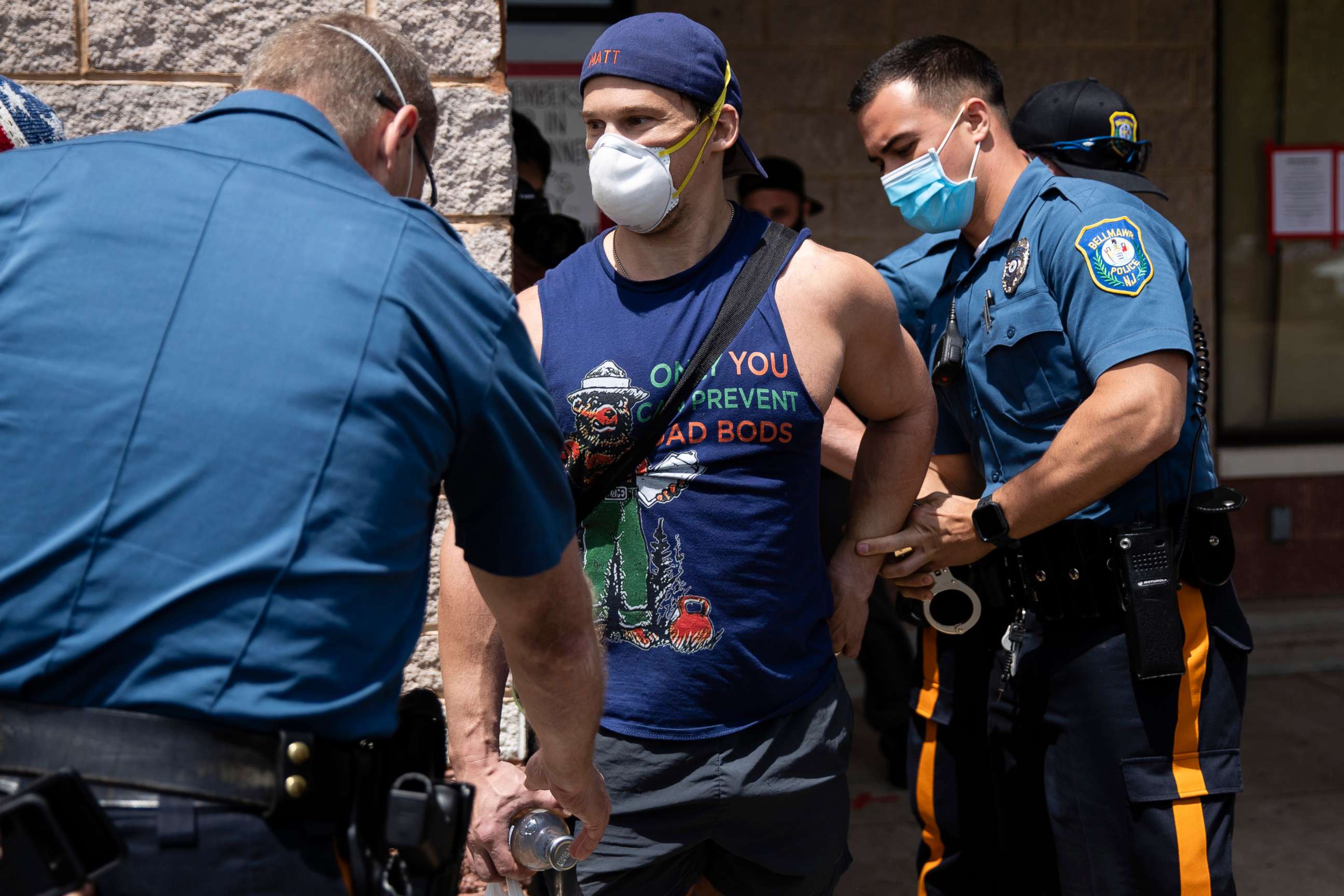
At least one person was detained by police after leaving the gym and having a verbal exchange with an officer, according to ABC Philadelphia station WPVI-TV.
The gym was closed Thursday morning after the state Department of Health issued a notice to the owners overnight shuttering the facility, writing it does not believe Atilis Gym or any business can "set their own divergent health measures, done without approval of the State and its health officials."
Cluster of COVID-19 cases
In recent days, business owners and patrons, and even churches across the country have become more emboldened about broaching restrictions set by government with mixed results.
--In Owosso, Michigan, 77-year-old barber Karl Manke reopened his shop this month in violation of Michigan Gov. Gretchen Whitmer's "Stay Home, Stay Safe" orders, which are in effect until May 28. Despite having his professional license suspended by the Michigan Department of Licensing and Regulatory Affairs, Manke is continuing to give haircuts. Armed members of the Michigan Militia showed up to guard the front door of Manke's business in case police showed up to shut him down, but officers never appeared. On Wednesday, The Michigan Conservative Coalition organized a protest dubbed "Operation Haircut" in support of Manke by giving free haircuts on the lawn outside the capitol building in Lansing. Despite having his license suspended, Manke gave free haircuts at the protest while wearing a mask and spoke to the crowd from the steps of the capitol building, saying, "I feel I have been denied my livelihood by this governor. Her actions are wrong. This is not a police state. I refuse to live in a police state. I will not stand down."
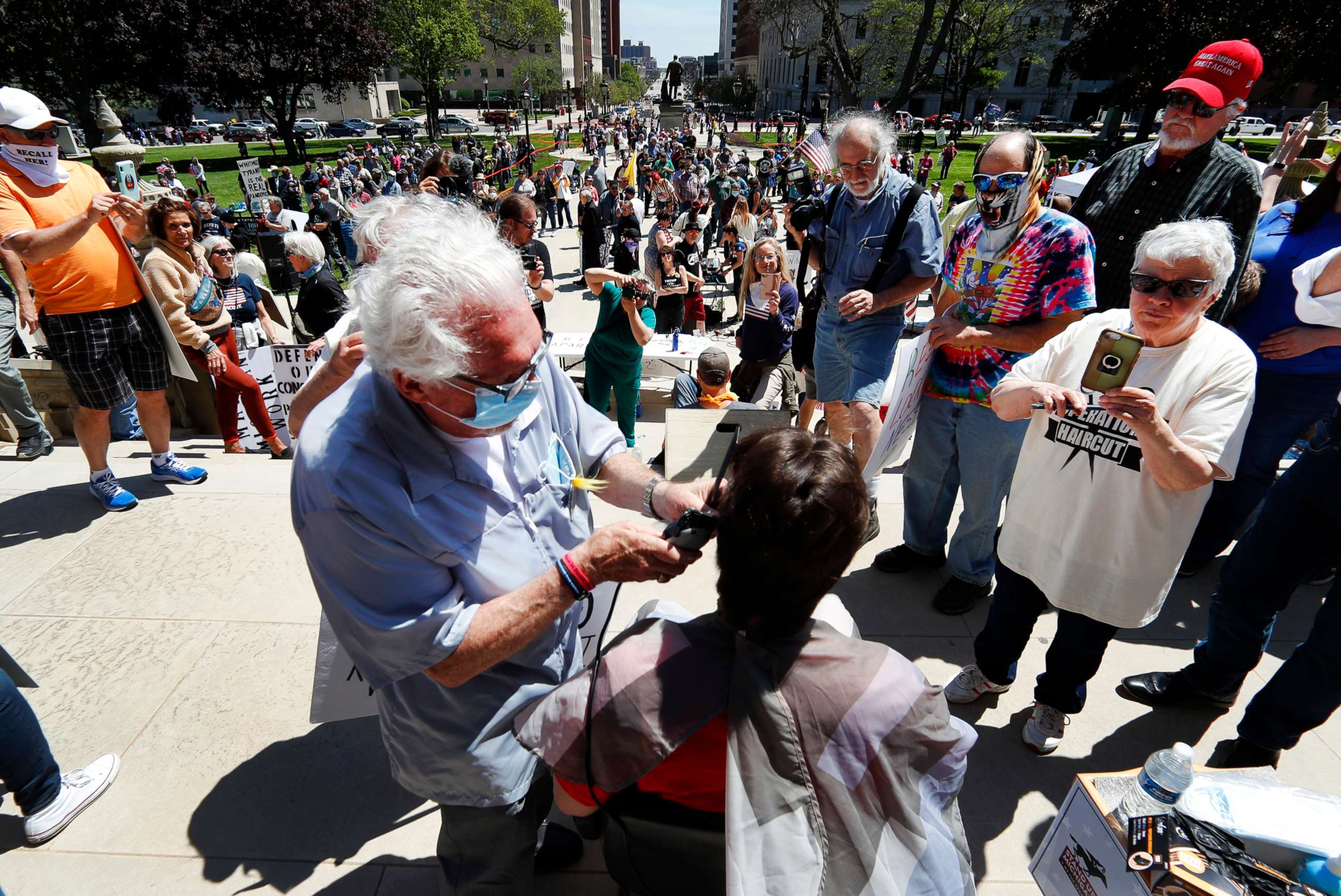
-- Dallas hairstylist Shelly Luther was jailed this month for keeping her business, Salon a la Mode, open despite multiple warnings, a citation, a cease and desist letter and a restraining order. Texas Gov. Greg Abbott, whose executive orders were allegedly violated by Luther, criticized a judge for sending Luther to jail, saying in a statement that "surely there are less restrictive means to achieving that goal than jailing a Texas mother." Luther said in an interview on ABC's "The View" that she decided to reopen because her employees were telling her that they were about to go do business underground. "I decided to open because it's not safe for them, obviously, to be going to people's houses, for them or their clients," Luther said. "I just felt like if I opened ... I could create a sterile environment and make it at least a lot safer and follow CDC guidelines and regulations. I really didn't want to be the reason why they weren't making money."
--In Los Angeles, authorities say an underground economy has opened up against Mayor's Eric Garcetti's "Safer at Home" orders with hairstylists, manicurists, pet groomers, tattoo artists and personal trainers covertly doing business. During an April 22 news conference, Los Angeles Police Chief Michel Moore said his department had issued 1,700 complaints against nonessential businesses illegally operating.
Some acts of defiance have come with health consequences.
--Earlier this month, the Pasadena Public Health Department announced that a cluster of COVID-19 cases was traced to a birthday party in the Southern California city. The party was held in violation of Gov. Gavin Newsom's stay-at-home orders, which forbids large gatherings.
--In Northern California, public health officials in Butte County notified more than 180 people last week that they may have been exposed to the coronavirus at a May 10 religious service held in violation of the state's stay-at-home orders.
Some acts of defiance have turned violent, particularly confrontations sparked by individuals refusing to wear protective masks.
--On Friday, a man police say was turned away twice for refusing to wear a mask at a Waffle House in Aurora, Colorado, was arrested for allegedly chasing the eatery's cook outside and shooting him after slapping the victim and threatening, "I'll blow your brains out," according to an affidavit obtained by ABC affiliate station KMGH-TV in Denver. The suspect, Kelvin Watson, 27, was charged with attempted murder while the cook is expected to recover.
--On May 1, two brothers were captured on surveillance video at a Van Nuys, California, Target store fighting with security guards trying to escort them out of the store for not wearing masks. The brothers, ages 31 and 29, were arrested on felony battery charges, according to the Los Angeles Police Department.
--One of the most violent encounters over masks also occurred on May 1 at a Flint, Michigan, Family Dollar store when security guard Calvin Munerlyn was gunned down after he ordered a woman to leave the store for not wearing a mask. The woman returned with her husband and son, who allegedly ended up shooting Munerlyn to death.
Inconsistency in messaging
Karen Kendrick, an assistant sociology professor at Albertus Magnus College in New Haven, Connecticut, told ABC News that the many acts of civil disobedience appear to be fueled by a growing mistrust of government leaders who have shared information about the virus and the best practices for guarding against it only to be contradicted by rapid development in the scientific study of the novel virus.
For instance, the Centers for Disease Control and Prevention (CDC) initially recommended people to not wear masks only to later advise people to wear them. Some models projecting the number of deaths and infections have proven to be wrong, although some government leaders have said the toll decreased because many people have stuck to social-distancing directives to flatten the curve of infection.
Each state has developed vastly different guidelines for reopening the economy, with some mandating reopenings be based on consistent declines in the number of deaths, infections, and hospitalizations while others have opened despite increases in the data.
All 50 states and Puerto Rico have begun easing restrictions, but none appears to have experienced a 14-day decline in cases, one of the criteria set forth in White House guidelines for reopening, according to an ABC News analysis.
President Trump, who has yet to be seen in public wearing a mask, has tweeted support for open-the-economy protesters even though many have defied best practices recommended by the White House Coronavirus Task Force.
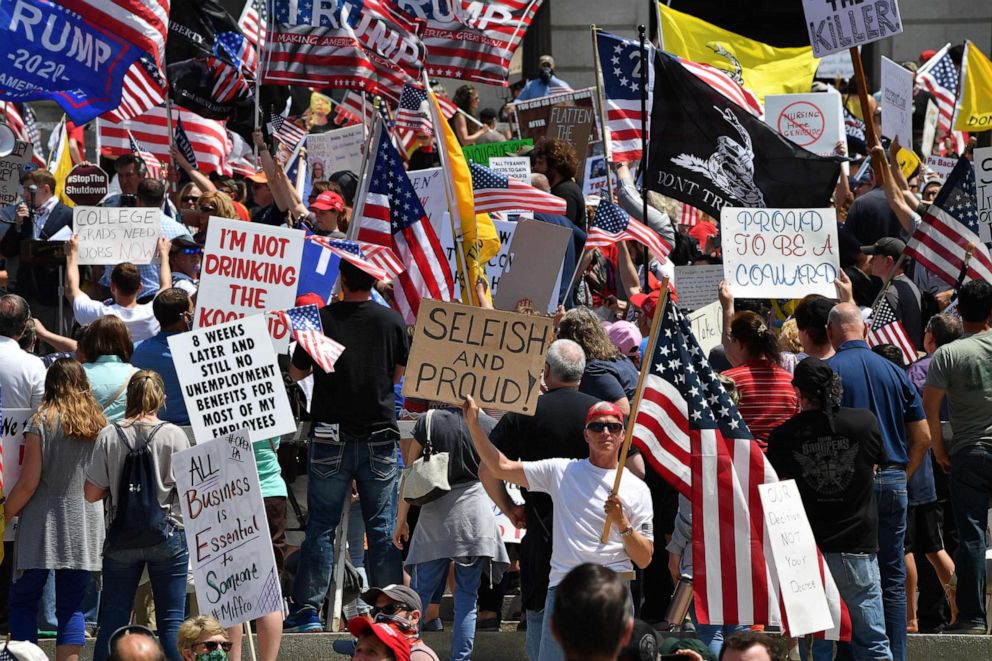
''Any public health researcher is going to tell you that the most important thing in any public health message is consistency. And our federal government has completely failed in its consistency. And if you compare state to state, there's tremendous inconsistency," Kendrick said. "So, of course, the public is not feeling confident and that's been really, to me, the biggest heartbreak of this whole thing because we could have had much better messaging and we wouldn't be in the place we are in right now.
"If the government says, 'We don't know,' or contradicts itself, then that is a message that no one knows," Kendrick said. ''It's sort of classic sociology: what makes society work, in part, is that human beings trust the social rules and so if the social rules are breaking down there's nothing left to trust.''
'Even disease gets politicized'
Pamela Oliver, a sociology professor at the University of Wisconsin, told ABC News that polarizing partisan politics in the United States is inspiring some of the backlash against stay-at-home orders and reopening restrictions.
"Even disease gets politicized and people are deciding that the infection rates are a political object," Oliver said.
She said that even wearing masks have become a political statement.
"It's either a political statement that you have communal instincts and want to help protect the community and believe that we should all be taking steps to stop disease, or not wearing a mask is a sign that you're standing up to oppression or something. It's very odd," Oliver said.
Oliver also said that conservative groups have organized many of the demonstrations and have apparently taken advantage of the confusion over the virus to push their own agendas and support for Trump, noting that many have been seen at rallies carrying banners and posters advocating the president's reelection.
"The mantra is open the economy, that the restrictions are silly," Oliver said. "People are legitimately worried about the economy and worried about jobs. But there's another level saying, what they really mean by opening the economy is forcing other people to go back to work so they don't have to be paid unemployment insurance, they don't get subsidies, they can be forced to work for low wages to meet the needs of other people."
Kendrick noted that many open-the-economy protesters have expressed a need for services they miss like getting a haircut or eating out in a restaurant, pleasures once taken for granted.
''Even though a lot of people are supporting the protests because they are afraid of the economic implications going on, many of the protesters themselves don't really seem to be motivated by that," Kendrick said. "They're motivated by that longing of, 'I want my life to go back to normal.'''
What to know about the coronavirus:
- How it started and how to protect yourself: Coronavirus explained
- What to do if you have symptoms: Coronavirus symptoms
- Tracking the spread in the U.S. and worldwide: Coronavirus map
Tune into ABC at 1 p.m. ET and ABC News Live at 4 p.m. ET every weekday for special coverage of the novel coronavirus with the full ABC News team, including the latest news, context and analysis.
